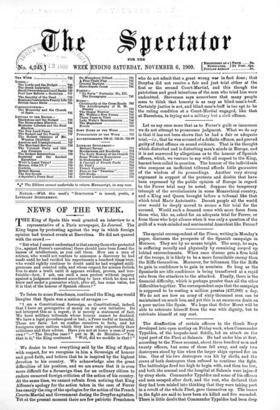Let us say once more that as to Ferrer's guilt
or innocence we do not attempt to pronounce judgment. What we do say is that it has not been shown that he had a fair or adequate trial,--i.e., that he was accused of a definite offence, and proved guilty of that offence on sound evidence. That is the thought which disturbed and is disturbing men's minds in Europe, and it is not answered by allegations as to the honour of Spanish officers, which, we venture to say with all respect to the King, has not been called in question. The honour of the individuals who compose an inefficient tribunal affords little guarantee of the wisdom of its proceedings. Another very strong argument in support of the protests and doubts that have been expressed by the public opinion of Europe in regard to the Ferrer trial may be noted. Suppose the temporary triumph of the revolutionists in some Monarchical country, and a King and Queen brought before a tribunal like that which tried Marie Antoinette. Decent people all the world over would be deeply moved to secure a fair trial for the accused. Would such a demand come with more force from those who, like us, asked for an adequate trial for Ferrer, or from those who kept silence when it was only a question of the guilt of a weak-minded and sentimental Anarchist like Ferrer ?






























































 Previous page
Previous page